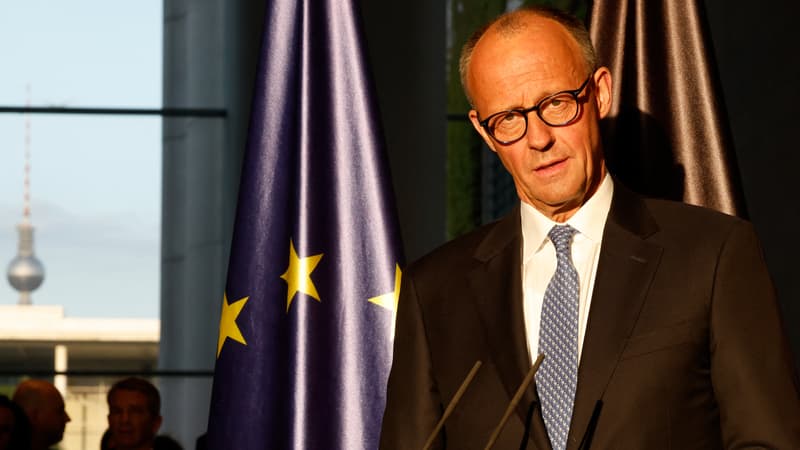After being chosen with pain, Friedrich Merz goes to a weakened German chancellor, this Wednesday, May 7, in Paris and then in Warsaw, two capitals where he hopes to relaunch the relations with suffering.
President Emmanuel Macron certainly congratulated him after his appointment by anticipating a frank-theme “stronger” motor. But Tuesday’s elections in Friedrich Merz’s formation in the supreme position for German deputies, after two voting rounds when it was going to be a worried formality.
She revealed to the daylight the political fragility of the conservative leader and her coalition with the social democrats, in which all Europe had to put Germany in the center of the game after years of surface under the era of Olaf Scholz and six months of internal political crisis.
A new “very European” chancellor
“The situation in Germany is a political shock,” said French MEP Valérie Hayer in X. “An absolute disaster,” said a French minister on condition of anonymity to AFP.
“Until now, I had returned the image of a united, strong and effective government. However, this message blurs. This blurs the image of Germany’s return to the European scene,” says Claire Demesmay, an associated researcher at the Marc Bloch center in Berlin, in an interview with AFP.
As usual in Germany, a completely new chancellor makes his first official visit abroad in France, then in Poland. On Tuesday night, Friedrich Merz, who will also go next Friday in Brussels, qualified for the NTV channel “Very European Chancellor”.
Much hopes on the French side
Paris feeds great hopes in the president of the Christian Democratic Party Germany, who speaks openly of strengthening European sovereignty, including the army.
The new German coalition government promises to “strengthen friendship” between Germany and France and with Poland, especially within the framework of the “Weimar triangle”, this trilateral cooperation forum between France, Germany and Poland created in 1991.
“The desire to exchange with these two countries is clearly there,” he said in an interview with the AFP Martin Koopmann, director of the Genshagen Foundation, based near Berlin and responsible for developing relations between these three countries. However, it emphasizes the complicated nature of the relations between Germany and Poland that, in addition, is not found in the euro zone unlike Paris and Berlin. The Nationalist Party et Justice (PIS), currently in opposition, continues to claim repairs for damages and losses of the Second World War of Germany.
Less than two weeks before the first round of the Polish presidential elections on May 18, this issue is particularly sensitive: for Prime Minister Donald Tusk, a convinced European, it is difficult to show too much proximity to the German Chancellor. Donald Tusk was also satisfied with X of a brief message of congratulations and a “see you tomorrow in Warsaw.”
On defense and Ukraine issues, the hostility that Donald Trump and his administration show with respect to Europe and doubts about US military support have made the lines move in Germany.
Deep differences
Friedrich Merz is favorable to the idea of placing his country, so far depending on American nuclear protection, under the French and British umbrella. This constitutes a great cesura with the tradition of the Germanic Atlantic. It is also cautiously open to the idea of providing long range missiles in Kyiv.
However, other traditional differences between these three countries should not disappear overnight.
Berlin has certainly softened in March his “debt brake” rule, which limits the country’s indebtedness capacity for military spending and regions, but is not ready to give the green light to the Euro lens, promoted by France.
On a commercial level, Germany, a strongly exporting nation, should continue to promote the signing of free trade agreements, such as Mercosur, while France, fearing an agricultural deep, is unfavorable.
“In terms of energy policy, the differences are also very strong between the three countries,” says Martin Koopmann, “even if Poland begins to resort to renewable energy and France has made some nuclear concessions.”
Source: BFM TV


